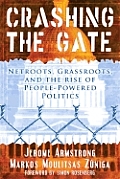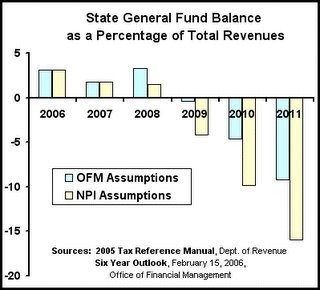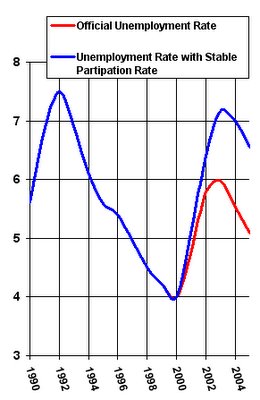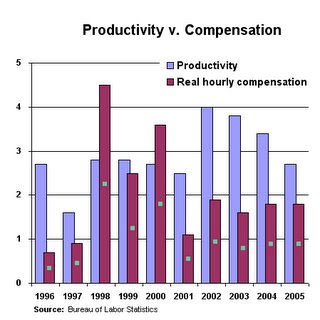As the title of this post notes, this is a review of
Crashing the Gate, a new book that explores why the Democratic Party is out of power and unable to win elections, especially at the federal level.

Now, the Northwest Progressive Institute doesn't normally publish book reviews, although we do have a
Reading List of titles we believe are worth buying or checking out from your local library.
But we couldn't pass up the opportunity for
Crashing the Gate, the first book from fellow bloggers Markos Moulitsas and Jerome Armstrong, of Daily Kos and MyDD, respectively.
So, on behalf of NPI, here is my review.
Crashing the Gate is a short and powerful primer which explains how the Democratic Party must be saved from itself. My first thought after I initially read it from cover to cover (in one afternoon) was how
concise and
captivating it was (the book itself is 177 pages - not counting the foreward or the endnotes).
Even if you're a regular reader at Daily Kos, and even if you've read material with similiar themes before (like Lakoff's
Don't Think of an Elephant, Brock's
The Republican Noise Machine, and AlterNet's
Start Making Sense) I think you'll still thoroughly enjoy
Crashing the Gate.
I think what's really appealing is that the book is written so that activists who aren't that familar with the blogging phenomenon can understand and appreciate the message it contains.
Markos and Jerome start off by quickly noting why abandoning the Democratic Party is a foolish idea, and why changing it (from within) is much more practical. They then launch into a clever categorization of the major
conservative groups within the Republican Party: the corporate cons, the neocons, the theocons, and the paleocons.
The examples they use to define each group are easily understandable because they're all recent - in fact, most are from 2005. That's another thing I really liked about the book. You get the feeling that it really is set in the present, and you can read all of it without skipping a beat (depending on how fast you read, of course).
Yet another intriguing feature of the book is the interwoven interviews, which are well incorporated into the text and clearly reinforce the points the authors are trying to make, instead of distracting the reader.
Markos and Jerome have done an admirable job of blending history and vision in the book. Other books I've read have given too much weight to one or the other, but
Crashing the Gate has a balance of both.
They begin the second section of the book with the succinct statement, "The Democratic Party stands for everything, yet it stands for nothing" opening the argument that the whole of the party is really never greater than the sum of its parts. I've certainly found this to be true in my own political experience.
Though the conservative movement has issue groups, Markos and Jerome say that those groups seem to operate outside of the structure of the Republican Party - often contributing to the success of the party from behind the scenes - whereas the progressive movement's single issue groups
are the party (and the face of the party).
The authors contend that most of the progressive "single issue" groups (i.e. environment, labor and reproductive rights) have such a narrow focus that they seem incapable of looking at the bigger picture - which is critical for long term success.
They point out the party needs to craft a broader narrative that helps explain what progressive, Democratic values are to voters. As Markos and Jerome observed, "At the end of the day, it's hard to build a movement or strengthen a political party when its constituency groups are tugging it in a dozen different directions."
And they note that while Washington D.C. may be mired in the archaic, status quo - progressives in states like Colorado and Montana (the two examples they used) have succesfully put together strategies for revitalizing the party and its message.
And they emphasize the bigger picture - over and over again: "Working to make sure Democrats win control is more important than sabotaging the chances of any candidate that doesn't check off every box on the liberal laundry list."
I agree wholeheartedly with that statement. It's why I support candidates like Maria Cantwell even though I may disagree with them on key issues.
One of the book's most powerful and sweeping paragraphs is about midway through the book. Markos and Jerome describe what must happen if Democrats want to win - not just in states that are considered bastions of liberal politics, but anywhere in the United States:
"The 'Democratic Party coalition' of the last few decades has failed. It must be replaced by a new progressive movement, one that is dedicated to finding those common bonds that tie us together while tolerating the sorts of differences inevitable in any 'big tent' gathering. And that movement needs to remain outside the party, giving Democratic candidates the freedom to get elected in all parts of the country without being smeared by association to any particular interest group."
Crashing the Gate then moves on to talk about how the Democratic establishment in Washington, D.C. has run roughshod over local candidates and local campaigns, stifling innovation and ignoring new talent in favor of hiring the same consultants over and over again - including consultants who keep losing.
Markos and Jerome demand to know why it makes sense to continually reward Democratic consultants for failure. "It's a veritable revolving door," they declare of the D.C. establishment. "The system is not a meritocracy."
Bob Shrum is notably singled out in this section for his terrible track record (0 for 8 in presidential elections) and his firm's tendency to pocket as much money as it can at the expense of the candidates Shrum and his cohorts are advising.
But the part of this section that I liked the most is the part which dissects how Democratic candidates - following the advice of their consultants - have been doing their advertising (and why it isn't very effective).
Markos and Jerome use examples from recent elections to back up their argument that Republicans have done a better job figuring out to appeal to voters' emotions, and note that the GOP regularly reaches out to Madison Avenue's corporate ad shops for help in crafting their messages.
And as you might expect, the two insist that Democrats begin to take advantage of the changing media landscape, and recognize that reaching voters today is different than it was twenty or thirty years ago.
Crashing the Gate makes a strong case for purging the party's loser consultants and rewarding success and innovation - not failure. And that change obviously cannot start with the consultants, because they aren't going to fire themselves. But it needs to happen if the party wants to start winning elections.
The next section of the book (Laying the Groundwork) details two important areas where the left has fallen behind - ideas and media - that have already been fairly well covered by authors George Lakoff and David Brock, who wrote
Don't Think of an Elephant and
The Republican Noise Machine, respectively. (In fact, oddly enough, one of the sections is entitled "THE NOISE MACHINE".)
This section does includes a short interview with George Lakoff, although there is no interview with Brock, which I would have liked to see. Brock, who currently heads Media Matters as its President & CEO, is perhaps the progressive movement's best expert on right wing media.
Markos and Jerome called attention to the amazing and incredibly rapid growth of the progressive blogosphere, which I agree has been growing by leaps and bounds.
Traffic to the Northwest Progressive Institute's network of websites has grown at a stunning rate. Traffic for the year 2004 was about thirty times higher than it was in 2003, but that was
nothing - traffic for the year 2005 was roughly
four hundred times higher than it was in 2004. Three months into 2006, it seems we'll be easily surpassing last year's record growth by the time December is over.
After talking about media, Markos and Jerome next move on to the conservative leadership pipeline - which is also something Brock and Lakoff covered - but
Crashing the Gate offers multiple examples and references that you won't find in either of the other two books.
The authors argue that the progressive movement needs to take better care of its young talent, creating networking and job opportunities and training candidates to run for office. Fortunately, there are already a few organizations trying to fill this void - Wellstone Action and Progressive Majority come to mind - but I agree that there needs to be a bigger effort.
In one of the last chapters (Civil War) Markos and Jerome use the story of Howard Dean's presidential election campaign to explain how the business of raising money has changed - and how McCain-Feingold forced the Democratic Party to reconnect with real people.
The chapter ends by describing Howard Dean's unlikely comeback to become Chairman of the Democratic National Committee, neatly transitioning into the last chapter of the book, which is based on several major themes (most importantly, show up - or compete - to win) and also paints a glowing future in online organizing for the progressive movement.
Crashing the Gate ends with the bold assertion that the progressive netroots movement is leaderless, decentralized, and truly organic (it cannot be "co-opted", as Markos and Jerome put it) and thus the people who comprise it are truly in control of their own destiny.
I am in absolute agreement with this conclusion. I can confidently say that I would not be where I am today without the Internet. Nobody told me to found NPI or Permanent Defense - I decided to create these organizations (and their websites) on my own.
I have encountered people who have tried to laugh off this organization as a joke or a powerless force, but I - and the people who have joined NPI - have remained undaunted. Markos and Jerome are right. We cannot be harnessed or controlled.
The online progressive community is not the new ATM for the entrenched Democratic establishment. It is not made up of spectators, either. It is made up of truly committed activists - many, if not most of whom are used to accomplishing a lot with very few resources. We will decide our own destiny.
Crashing the Gate is simply a beautifully written book with an inspiring, enlightening message. The text is practically seamless and transitions well from one topic to the next.
It offers knowledge, but more importantly, it offers wisdom - and a realistic vision for changing the Democratic Party. It is a breath of fresh air for the progressive movement - and a welcome addition to my library.
I'll be strongly recommending
Crashing the Gate to my neighbors, who remain puzzled as to why John Kerry ended up losing the 2004 presidential election and are discouraged about the future of this great country. Now I can give them something short and powerful to read that will also give them hope.
If you haven't purchased your copy of
Crashing the Gate, I strongly encourage you to buy it from
Chelsea Green or
Powell's. You can also ask your local library system to stock the book, whether you're buying it or not, I've asked KCLS - the
King County Library System - to add it to their catalog.
 Chevy launched the website as part of their big promotional for "The Apprentice", Donald Trump's "reality" show, which is currently in its fifth season. (It airs Monday nights on NBC). They probably have no idea what they have unleashed...
Chevy launched the website as part of their big promotional for "The Apprentice", Donald Trump's "reality" show, which is currently in its fifth season. (It airs Monday nights on NBC). They probably have no idea what they have unleashed...




 Cantwell followed these extensive and captivating presentations with a speech that was smoothly and passionately delivered.
Cantwell followed these extensive and captivating presentations with a speech that was smoothly and passionately delivered. Senator Barack Obama followed Cantwell with a powerful and inspiring speech that was filled with wisdom and common sense. He also condemned the Bush administration's inexplicable, outrageous cuts in education funding.
Senator Barack Obama followed Cantwell with a powerful and inspiring speech that was filled with wisdom and common sense. He also condemned the Bush administration's inexplicable, outrageous cuts in education funding.  Now, the Northwest Progressive Institute doesn't normally publish book reviews, although we do have a
Now, the Northwest Progressive Institute doesn't normally publish book reviews, although we do have a  The newspapers shown in blue are papers that the McClatchy Company already owns or will own when it buys Knight Ridder.
The newspapers shown in blue are papers that the McClatchy Company already owns or will own when it buys Knight Ridder.  The initiative with the most petitioners right now (according to reports) is Initiative 917, Tim Eyman's initiative to gut transportation funding.
The initiative with the most petitioners right now (according to reports) is Initiative 917, Tim Eyman's initiative to gut transportation funding. 

 NPI opposes the construction of a new viaduct for multiple reasons - primarily because it isn't the safest option, but also because it would be another ugly eyesore and a barrier to making the city a better place.
NPI opposes the construction of a new viaduct for multiple reasons - primarily because it isn't the safest option, but also because it would be another ugly eyesore and a barrier to making the city a better place. 
